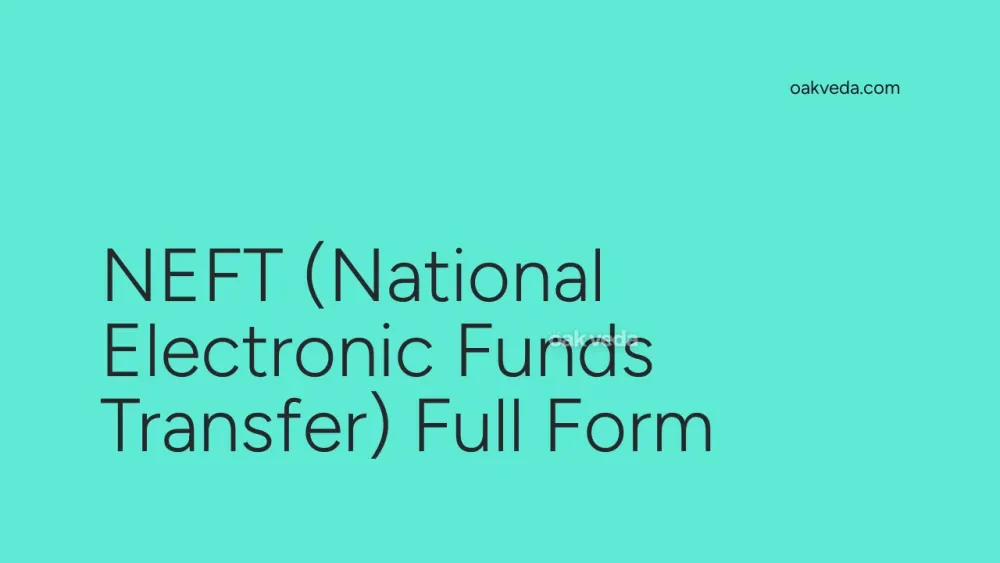
What is the Full Form of NEFT?
NEFT is an acronym that stands for National Electronic Funds Transfer. This electronic payment system is widely used in India for transferring funds between bank accounts.
What is National Electronic Funds Transfer?
National Electronic Funds Transfer (NEFT) is a nationwide electronic funds transfer system facilitated by the Reserve Bank of India (RBI). It enables individuals, businesses, and organizations to transfer money electronically from one bank account to another across India.
Origin and Development of NEFT
The NEFT system was introduced by the RBI in November 2005 to modernize the payment landscape in India. It was designed to replace the paper-based fund transfer methods and provide a more efficient, secure, and convenient way to transfer money electronically.
How does NEFT work?
NEFT operates on a batch settlement basis, which means that transactions are processed in hourly batches throughout the day. Here's a step-by-step breakdown of how NEFT works:
- The sender initiates a NEFT transaction through their bank's online banking platform, mobile app, or by visiting a branch.
- The sender's bank verifies the transaction details and debits the amount from the sender's account.
- The transaction is then sent to the NEFT clearing center operated by the RBI.
- The clearing center sorts the transactions and sends them to the respective recipient banks.
- The recipient's bank credits the amount to the beneficiary's account.
- Both the sender and recipient receive notifications confirming the transaction.
Functions of NEFT
NEFT serves several important functions in the Indian banking system:
- Domestic fund transfers: Enables seamless transfer of funds between bank accounts within India.
- Cross-border remittances: Facilitates one-way fund transfers from India to Nepal under the Indo-Nepal Remittance Facility Scheme.
- Bulk payments: Allows businesses to make multiple payments simultaneously, such as salary disbursements or vendor payments.
- Regular bill payments: Enables individuals to set up recurring payments for utilities, rent, or loan installments.
Applications of NEFT
NEFT has a wide range of applications in various sectors:
- Personal banking: Individuals use NEFT for transferring money to friends and family, paying rent, or settling bills.
- Business transactions: Companies utilize NEFT for vendor payments, salary disbursements, and inter-company fund transfers.
- Government payments: Various government departments use NEFT for disbursing subsidies, pensions, and other benefits.
- Educational institutions: Schools and colleges receive fee payments through NEFT.
- E-commerce: Online businesses often use NEFT as a payment option for customer refunds.
Features of NEFT
NEFT offers several key features that make it a popular choice for electronic fund transfers:
- Wide coverage: Available across all bank branches in India that are NEFT-enabled.
- No minimum or maximum limit: Transactions of any amount can be processed through NEFT.
- Scheduled transfers: Users can schedule future-dated transfers.
- Batch processing: Transactions are processed in hourly batches for efficiency.
- SMS and email notifications: Both sender and recipient receive transaction alerts.
- Secure transactions: Uses encryption and other security measures to protect financial data.
Benefits of NEFT
The NEFT system offers numerous advantages to users:
- Convenience: Transfers can be initiated 24/7 through online and mobile banking platforms.
- Cost-effective: Generally involves lower fees compared to traditional wire transfers.
- Speed: Most transactions are completed within a few hours.
- Transparency: Users can track the status of their transactions.
- Paperless: Reduces the need for physical cheques and cash handling.
- Accessibility: Available to all bank account holders in India.
Limitations or Challenges of NEFT
Despite its benefits, NEFT does have some limitations:
- Time restrictions: NEFT transactions are processed only during bank working hours.
- Not real-time: Unlike RTGS, NEFT operates on a batch settlement basis, which can cause slight delays.
- Dependency on technology: System downtimes or technical glitches can disrupt services.
- Limited international transfers: Primarily designed for domestic transfers, with limited cross-border capabilities.
Future Developments in NEFT Technology
The RBI continues to enhance the NEFT system to improve its efficiency and user experience. Some potential future developments include:
- 24/7 real-time settlement: Moving towards instant fund transfers at any time.
- Integration with emerging payment technologies: Incorporating blockchain or other innovative technologies for enhanced security and speed.
- Expanded cross-border capabilities: Extending NEFT services to more countries for international remittances.
- Enhanced mobile integration: Improving mobile app interfaces for easier and more secure transactions.
FAQs on NEFT Full Form
-
What is the full form of NEFT? NEFT stands for National Electronic Funds Transfer.
-
Is there a limit on NEFT transactions? There is no minimum or maximum limit set by the RBI for NEFT transactions. However, individual banks may set their own limits.
-
How long does a NEFT transaction take? NEFT transactions are processed in hourly batches and typically completed within a few hours.
-
Can NEFT be used for international transfers? NEFT is primarily for domestic transfers within India, with limited cross-border capabilities (currently only to Nepal).
-
What information is needed for a NEFT transfer? You need the recipient's name, bank account number, IFSC code, and bank branch details to initiate a NEFT transfer.
-
Is NEFT available 24/7? While NEFT transactions can be initiated 24/7, they are processed only during bank working hours.
-
How is NEFT different from RTGS? NEFT processes transactions in batches, while RTGS (Real-Time Gross Settlement) processes high-value transactions in real-time.
-
Is NEFT safe and secure? Yes, NEFT is considered safe and secure as it uses encryption and other security measures to protect financial data.
You may be interested in:

